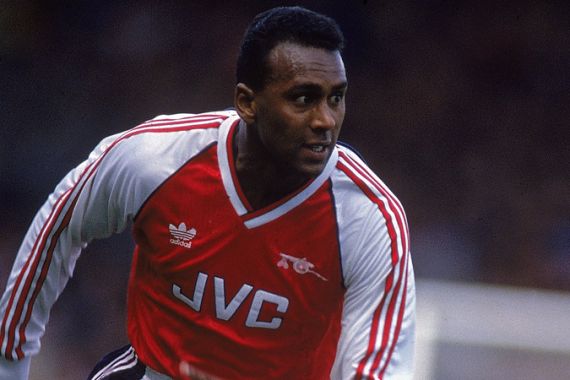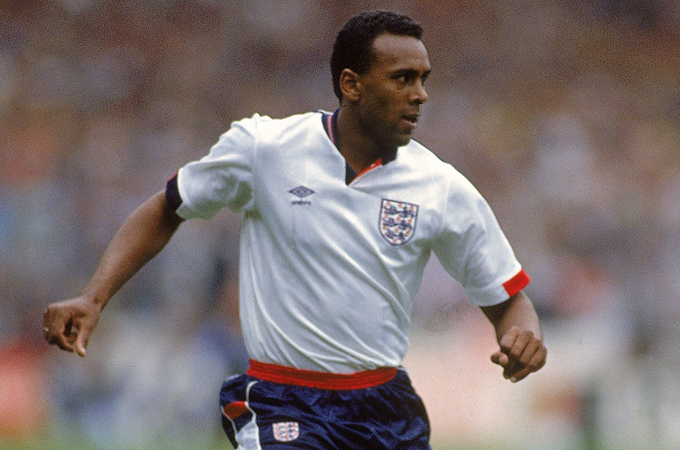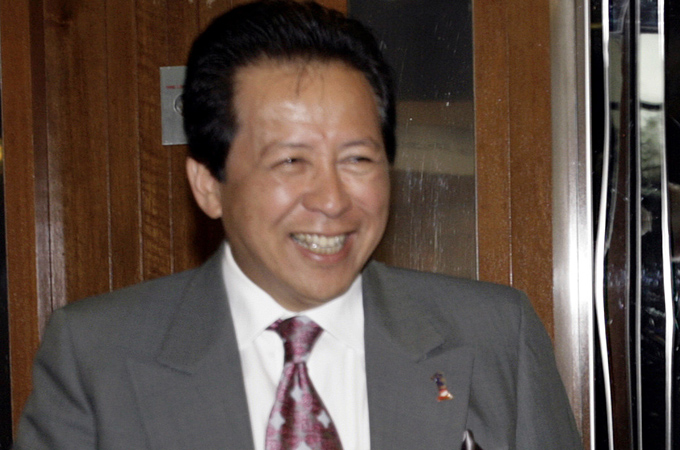Rocky remembered in Borneo
Arsenal and England player who died of cancer 10 years ago left a lasting legacy at Malaysian team where career ended.

 |
| Rocastle played for four major English clubs before ending his career in the Malaysian league [GALLO/GETTY] |
The Arsenal internet messageboards lit up last week to mark the 10th anniversary of the passing of Gunners great David Rocastle, who died on the morning of the 2001 north London derby at the age of 33 from non-Hodgkin’s lymphoma.
Also paying their respects were fans on the Southeast Asian island of Borneo, where the former England midfielder ended his playing days.
Keep reading
list of 4 itemsStruggling Everton dent Liverpool title hopes in pivotal Merseyside derby
Record win against Chelsea moves Arsenal three clear in Premier League
‘Disgrace’: Ten Hag slams criticism over Man United’s FA Cup semifinal win
Spending two seasons with east Malaysian state side Sabah in 1998 and 1999, Rocastle was one of the biggest names to grace the Asian club stage, along with fellow English stars Gary Lineker and Tony Cottee.
|
“Pictures get lost but memories of David will always be inside me. We say that when God created people like David he threw away the mould” Ken Shellito, former Chelsea player and Sabah manager |
Rocastle, who had also played for Chelsea, Leeds United and Manchester City, had won 14 international caps and four trophies at club level, including two top-flight titles with Arsenal.
By the time he came to Malaysia, Rocastle was turning 31, was slowed by injury, and had just finished a loan spell at Hull City in the English third division.
Yet in Borneo he made an instant impression in this hitherto little-known chapter of a great career.
“Considering what he’d achieved, we were expecting a bit of a prima donna,” said the former Sabah FA president, Datuk Anifah Aman.
“But David was very humble and dedicated and would turn up early for training and be one of the last to leave. He made an effort to learn all the unfamiliar names of his teammates and took a genuine interest in them.”
Today, Anifah is the Foreign Minister of Malaysia and spent this week on official business in the Korea Republic with the nation’s Prime Minister.
A lifelong Arsenal fan, he studied in London during Rocastle’s heyday in the late 1980s and helped bring off an audacious coup by signing ‘Rocky’ to the unheralded Malaysian league, with the help of club manager Ken Shellito, a former Chelsea player and coach.
Top drawer
“The president asked if I could get a foreign player of quality from the UK and I went for David who was top drawer in every way,” Shellito said.
“He was always available on and off the field to help. With his presence and attitude, the team did well and individual performances improved.”
 |
| Rocastle was capped just 14 times for England despite his club success [GALLO/GETTY] |
Anifah added: “We didn’t think that we could afford him, but money was never an issue for David. He just wanted to be of help and work with the youngsters. Thanks to him, many of those youngsters became very good players.”
No longer the free-running, goal-scoring midfielder who lit up Highbury, Rocastle often played in a more central role in which he opened up opportunities for his teammates.
“He had some problems with his knees so he wasn’t as fast as before but his passing and positional play were excellent,” Anifah said.
“It took a while for the players to get used to his style but once they did he was a true asset. There was never a time when I wasn’t happy with David’s effort or performance.”
Rocastle still had the knack of occasionally producing outstanding goals.
Perhaps the best from his Malaysia stint was a long-range effort in a 4-1 home win against Perak in 1998.
Jaws dropped at the Likas Stadium in Kota Kinabalu as Rocastle volleyed the ball in from 50 metres.
“After the match, the Perak manager jokingly renamed him ‘David Rascal’,” Shellito said.
Rocastle remained a refreshingly down-to-earth character, despite his skills and a footballing resume that included winning the 1987 League Cup with Arsenal (he’d scored a late winner in the semifinal against Tottenham), becoming Leeds United’s most expensive signing in 1992 and scoring twice for Chelsea in the European Cup Winners’ Cup in the 1994-95 season.
“When David first arrived, I took him to a local food-stall and he didn’t have any trouble adapting to the local environment,” said former Sabah assistant manager Anuar Ayub.
“I introduced him to the local banana fritters (goreng pisang) and he instantly took a liking to them. He later confessed that he was ‘addicted’ to them.”
Illness
Sadly, the first signs of Rocastle’s illness, as yet not diagnosed, emerged during his two seasons with Sabah. But he refused to let on that he was feeling unwell.
Anuar said: “I noticed that he was losing weight and hair quite dramatically but David never told any of us that he was already quite sick by then. He was always his normal self whenever we met.”
Some former teammates and opponents have speculated that Rocastle may be living today had his illness been detected during his final professional chapter in Malaysia.
His health deteriorated on his return to the UK in 1999 but it wasn’t until February 2001 when he was finally diagnosed with Hodgkin’s lymphoma, a cancer of lymph tissue.
 |
| Malaysian Foreign Minister Anifah Aman used to be the Sabah FA president [EPA] |
Rocastle died in the early hours of March 31, 2001, survived by his wife Janet and three young children.
Six weeks later, his son Ryan was Arsenal’s mascot in the FA Cup final against Liverpool.
The club named a youth training facility after Rocastle and he is one of 32 club legends whose image is painted on the side of the new Emirates Stadium.
“Soon after David had passed away we got the news via a message from the UK,” Anifah said.
“All of us were genuinely shocked.”
Now a video analyst at the Asian Football Confederation, Shellito had only learned of Rocastle’s grave illness during his final days in hospital.
He says that Arsenal’s ongoing tribute to their former apprentice shows that the often hard-nosed professional game still has a heart deep down.
Even today, the Gunners fans still chant Rocky’s name at home games and speak of him with respect and reverence.
“Pictures get lost but memories of David will always be inside me,” Shellito said.
“We say that when God created people like David he threw away the mould.”
Jason Dasey (www.jasondasey.com) is an Asia-based international broadcaster of the English Premier League, a corporate emcee and media trainer. This column first appeared in the South China Morning Post on April 9.
Al Jazeera is not responsible for the content of external websites.